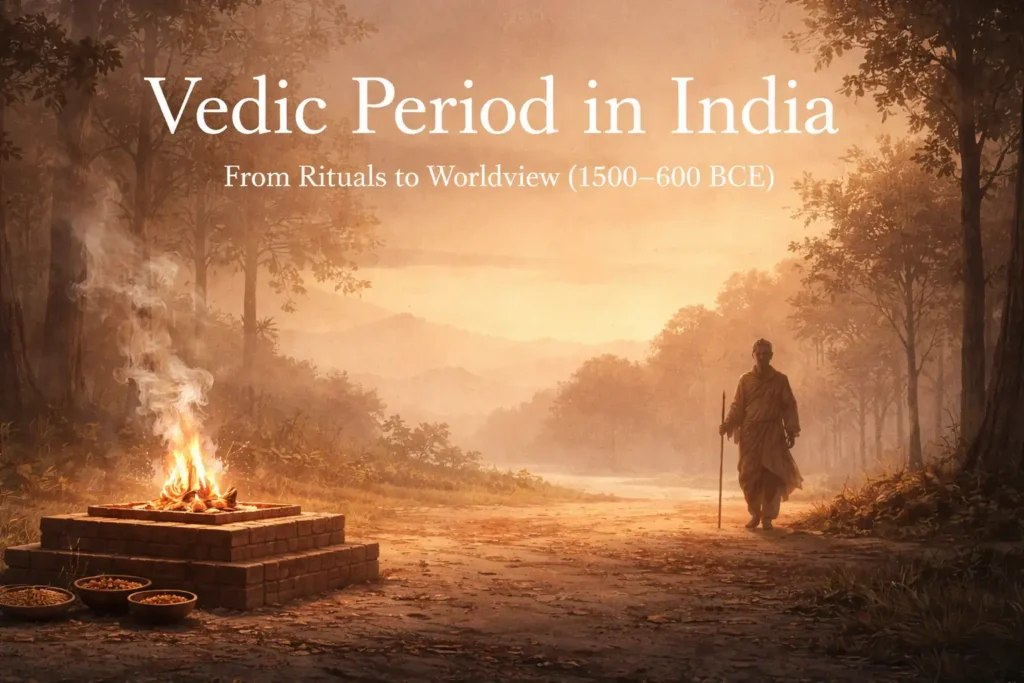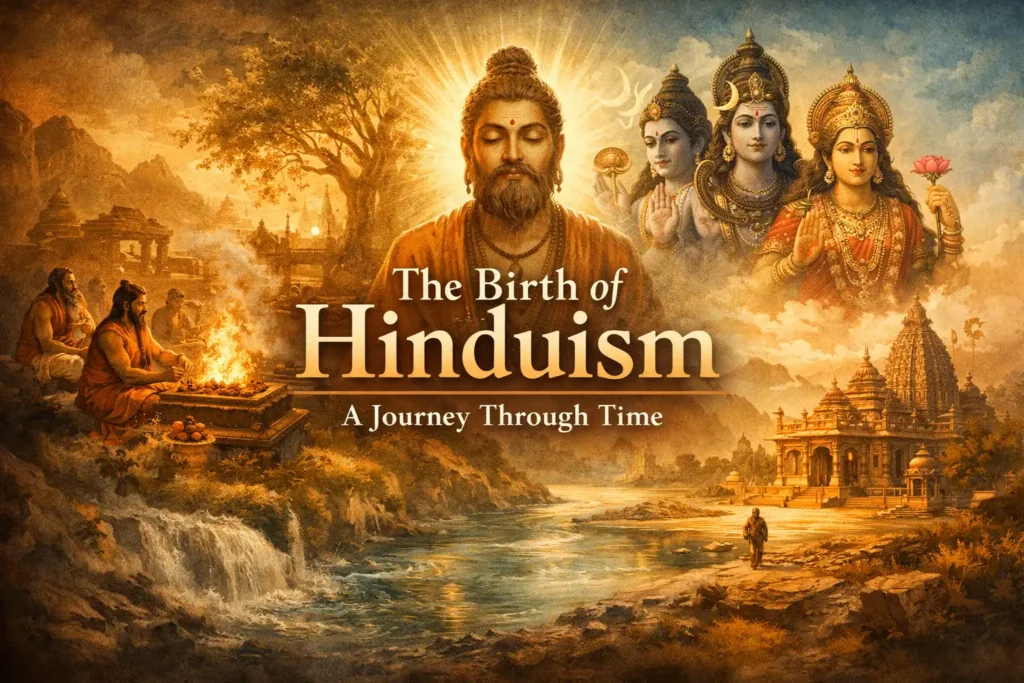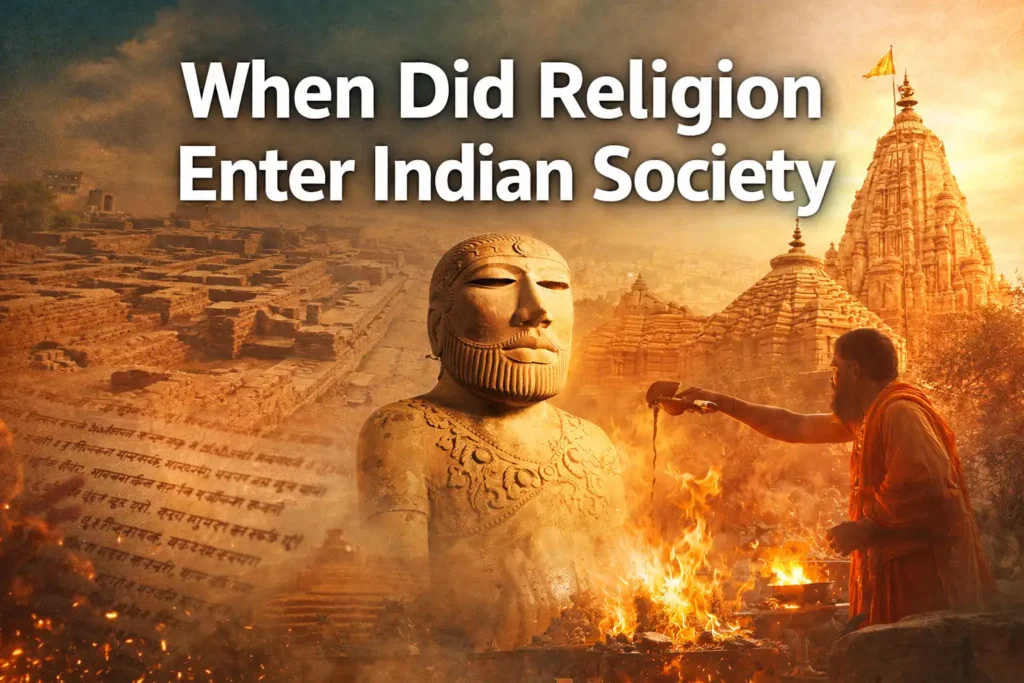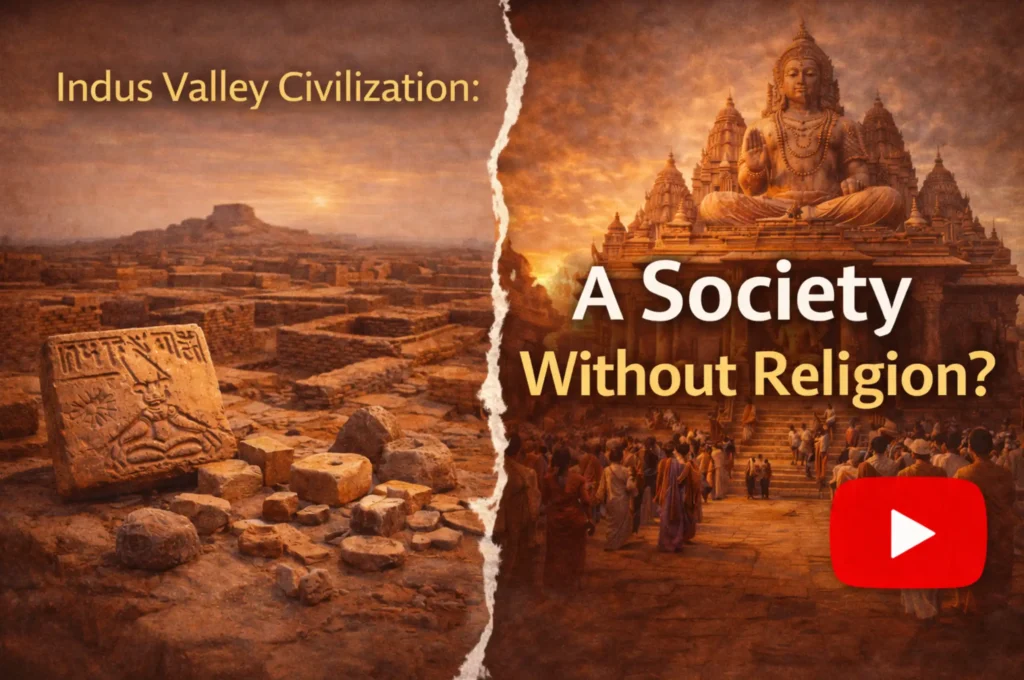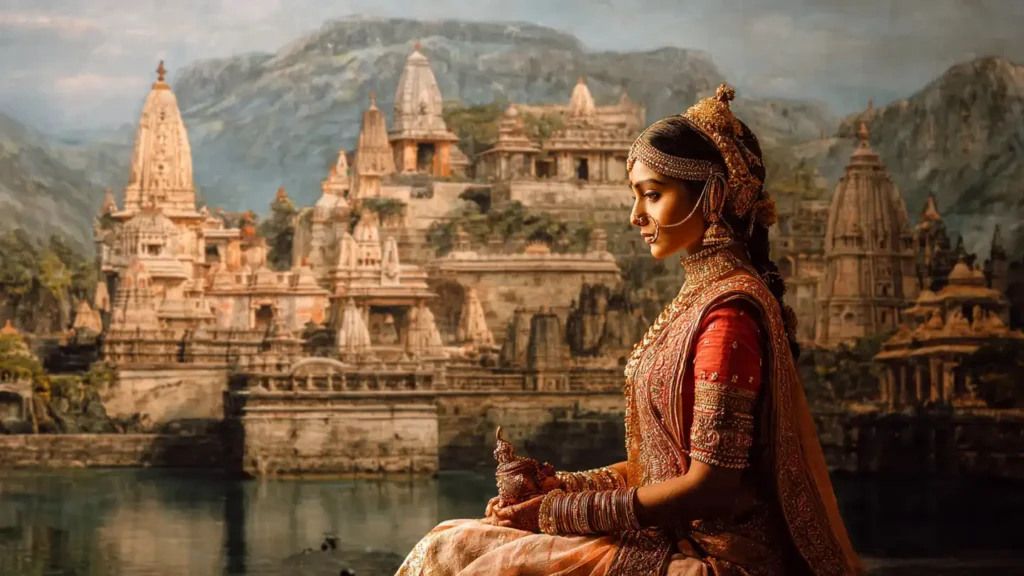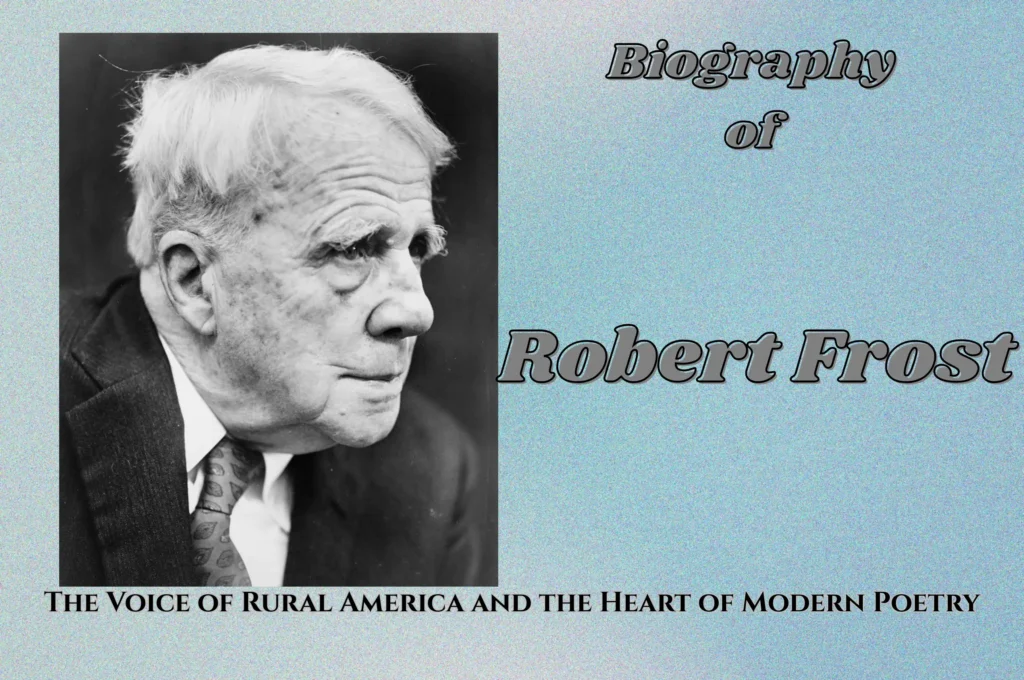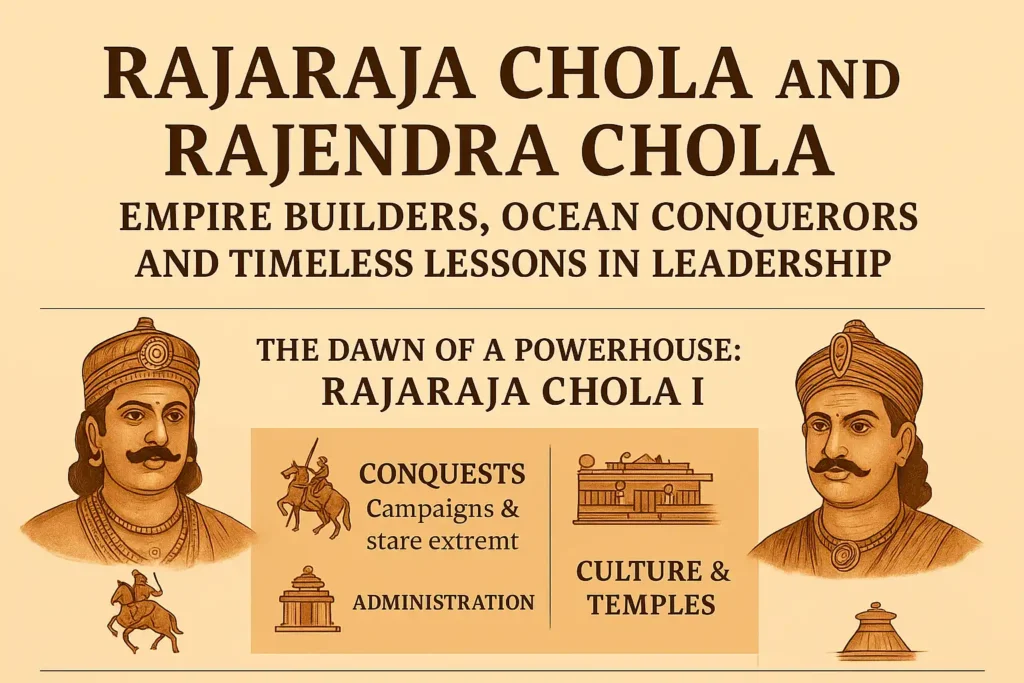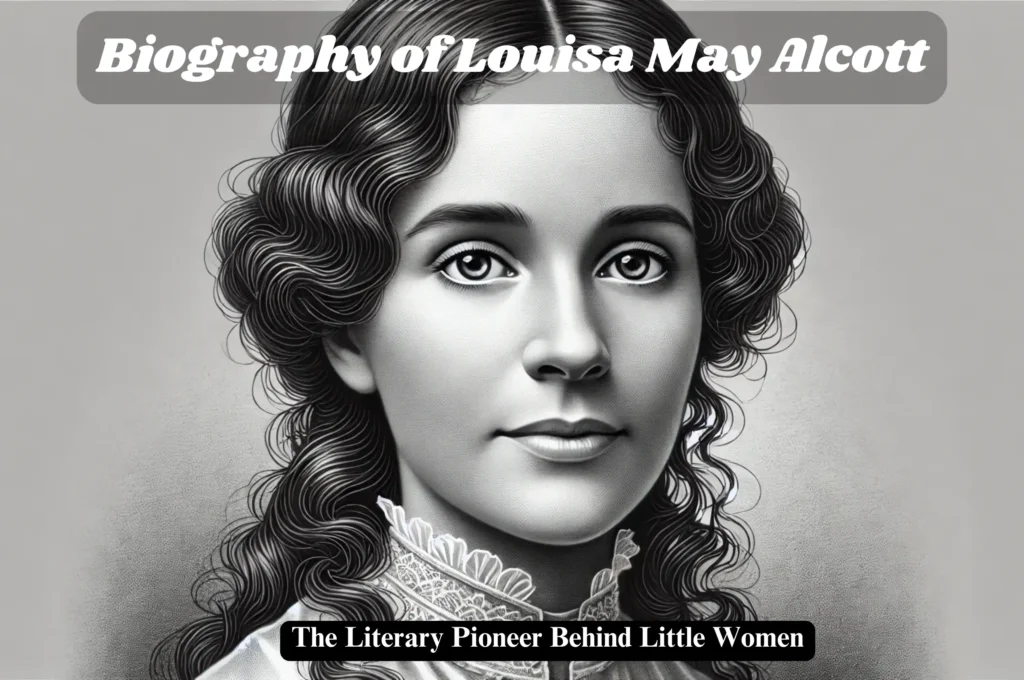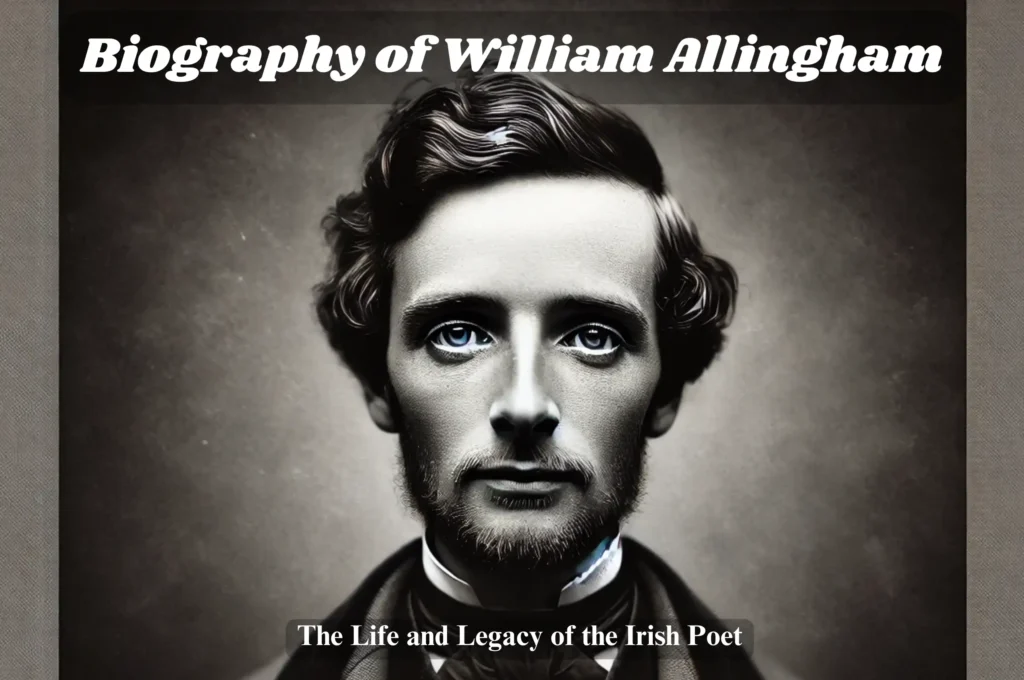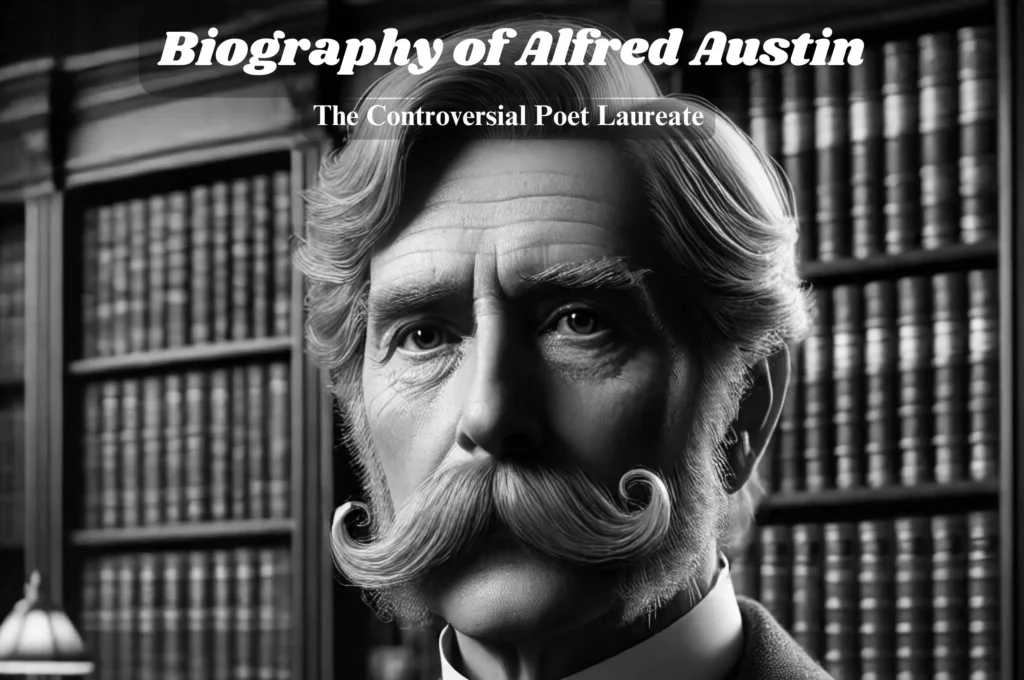Introduction: Who Was Mirabai?
Mirabai is the immortal figure of 16th-century India and symbolizes endless love and poetic excellence. She belonged to the royal family of the Rajputs but turned her back on all norms of the society through her intense spiritual association with Lord Krishna, whom she worshipped as her divine bridegroom. Her life, full of both privileged living and deep spiritual hankerings, has forever left its mark on Indian culture and the devotional tradition.
But the importance of Mirabai as a poet lies not in her poems; she embodies the spirit of bhakti. Hymns and poems, generally called bhajans, are expressions of heartache, longing, and surrender for Lord Krishna. View these compositions not only as works of art or pieces of literature but as spiritual outpourings that continue to inspire millions of devotees across the world.
Historically, the life of Mirabai depicted spiritual inclinations. Amidst much familial opposition and social odds, her path toward her spiritual ideals never diminished. Her disregard for accepting what a Rajput princess was supposed to do proves it further. This act of antagonism and devotion has made her a much-respected, admired figure in Indian history.
In the spiritual sphere, Mirabai’s legacy is enormous. Her life and works have motivated the Bhakti movement in-depth, a devotional trend wherein personal devotion to deities supersedes ritualistic practices. To put it another way, Mirabai expressed through her poetries a means of worship common for all—lending it universal appeal beyond the boundaries of social and caste divisions. This has secured her place as a saint dear to many hearts whose forays continue to inspire and guide the culturally deprived masses.
The influence of Mirabai is thus at once multidimensional: historical, cultural, and spiritual. Her life story, marked by undaunted devotion and poetic genius, continues to enchant and inspire people in their quest for excellence, especially against daunting adversities, and it has made her a timeless icon of Indian heritage.
Biography of Mirabai / Better Known as Meera

Table of Contents
Early Life of Mirabai and Royal Upbringing
Mirabai was born in 1498 into the prestigious Rajput family of Merta, Rajasthan. As the daughter of Ratan Singh, she was introduced to a life of privilege and luxury from an early age. The royal household, known for its adherence to tradition and cultural richness, provided Mirabai with an environment full of luxury and expectations. Her upbringing was characterized by a blend of martial valor and deep-rooted spiritual traditions that the Rajput clan revered. This unique combination of influences played a significant role in shaping her formative years.
From a young age, Mirabai was exposed to the grandeur of royal ceremonies and the responsibilities that came with her noble birth. The Rajput family expected her to embody the virtues of loyalty, bravery, and kindness. These expectations were from her family and the society both. Royal women were often seen as the guardians of cultural and religious values. Despite the privileges of her position, Mirabai’s early life was also marked by a sense of duty and an adherence to the customs that governed Rajput society.
Her education was extensive, covering both the fighting skills appropriate for a Rajput princess and the scholarly activities required by her role. She received an education in music, literature, and religious scriptures. This laid the foundation for her future endeavors as a poet and a devout follower of Krishna. Early exposure to spiritual teachings and the arts significantly influenced his worldview, increasing his innate inclination toward devotion.
Mirabai’s early experiences within the royal household played an important role in shaping her future path. The confluence of wealth, education, and spiritual guidance provided the tools to pursue her ultimate journey of devotion and poetic expression. It was within these walls of prosperity and hope that Mirabai’s story began, setting the stage for her profound legacy in the annals of Indian history.
Mirabai’s Marriage to Bhoj Raj
Mirabai was married off to Bhoj Raj, the Mewar crown prince. The marriage of Mirabai to Bhoj Raj was a great political and social event. It was scientifically arranged by her family, who wished to establish ties and strengthen bonds of amity between two powerful Rajput clans. Being a princess, Mirabai was supposed to take up the normal responsibilities, which included running the home, attending court affairs, and matching the pride and prestige of her new family. All these activities, however, could not kill her love for Lord Krishna.
In the early years of her married life, Mirabai balanced her royal duties with her spiritual pursuits. Her husband, Bhoj Raj, had known at the very outbreak of their marriage that she had consecrated her life to Krishna, to which he initially put up no objections. However, the conventionalism of society frequently conflicted with her devotion, which most of the time created a complex dynamic in the royal household itself. Being a member of the Mewar royal family, Mirabai lived in an atmosphere of duty, honor, and loyalty.
Her marriage to Bhoj Raj was not merely a personal affair; rather, it was a strategic alliance meant to strengthen the political landscape of the time. But none of this deterred her from revealing her spiritual longings in poems and songs which went on to become an inspiration to many.
Being a princess, Mirabai had to tread through the intricate fabric of courtly life, in which political alliances and family expectations were always a more potent force than personal desires. Notwithstanding this fact, Mirabai clung to her beloved Lord Krishna, distinguishing herself in an age where such love was rare. Her faith in Krishna and, correspondingly, the poetic expression of her love start to transcend the bounds of the royal palace, setting a base for her perpetual legend.
Mirabai’s Love and Devotion to Krishna
The life of Mirabai symbolizes selfless dedication and pure love for Lord Krishna, whom she looked upon as her true husband. This very nearness to Krishna was not only a devotional bent of mind but the very cornerstone of her existence. From a young age, Mirabai’s attachment to Krishna transcended the ordinary bounds of devotion, leading her to perceive His presence in every aspect of her life.
Her deep devotion to Krishna often stood her against many accepted social and familial norms. For a member of the royal Rajput family in the early 16teenth century, the kind of devotion that Mirabai followed was somewhat unconventional and at times even considered rebellious. Non-conformity to typical roles expected from a princess—especially disinterest in worldly affairs and marital duties—caused strife within her family. This single-mindedness for the worship of Krishna impelled Mirabai to renounce the worldly luxuries of palace life and take on a life of spiritual asceticism.
Despite facing considerable opposition, including threats to her life, Mirabai’s devotion remained unshaken. She composed numerous bhajans (devotional songs) expressing her deep love and longing for Krishna. These compositions, written in the vernacular language, were accessible to the common people and resonated with their own experiences of divine love and devotion. Her poetry not only immortalized her spiritual journey but also inspired countless others to seek a personal and intimate relationship with the divine.
The intensity of Mirabai’s devotion to Krishna is vividly illustrated in her bhajans, which frequently portray Krishna as her beloved and eternal companion. Her songs reflect a profound sense of surrender and an unwavering faith that Krishna would always be by her side, regardless of the trials she faced. This unyielding devotion not only defined Mirabai’s life but also left an indelible mark on the bhakti movement, influencing generations of devotees and poets who came after her.
These lines by Mirabai in “Ab Na Rahungi Tor Hath Ki” express her rebellious behavior and love for Krishna.
Ab Na Rahungi Tor Hath Ki
राणा जी…हे राणा जी
~ Bhajans by Mirabai
राणा जी अब न रहूंगी तोर हठ की
साधु संग मोहे प्यारा लागे
लाज गई घूंघट की
हार सिंगार सभी ल्यो अपना
चूड़ी कर की पटकी
महल किला राणा मोहे न भाए
सारी रेसम पट की
राणा जी… हे राणा जी
जब न रहूंगी तोर हठ की
भई दीवानी मीरा डोले
केस लटा सब छिटकी
राणा जी… हे राणा जी!
अब न रहूंगी तोर हठ की।
=================
Rana ji…oh Rana ji
Rana ji, I will not be obstinate anymore
I like the company of a sadhu
The veil has lost its modesty
Take off all your necklaces and ornaments
Bangles and sashes
Rana, I do not like the palace and the fort
All the silk and silk
Rana ji…oh Rana ji
When I will not be obstinate anymore
Meera has become crazy and sways
All the locks of hair have scattered
Rana ji…oh Rana ji!
I will not be obstinate anymore.
Mirabai and The Poison Incident
As we read about the devotion of Mirabai to Lord Krishna and how deep was her love with Krishna. She used to sing bhajans and devotional songs with normal people of the kingdom and it was not acceptable by the Royal Family. Often she was called Mira Diwani (Mira Mad in Love). Her act was against the family and social norms, as a princess should not sing and dance with the normal public.
One of the most dramatic episodes in her life is the poison incident. She drank a deadly poison in the name of Krishna. This Poison Incident has been narrated through generations and is seen as the height of her devotion. This incident not only underscores her unmatched devotion to Lord Krishna but also fortifies her legacy as a divine figure.
In an attempt to end her defiance, Mirabai’s in-laws devised a sinister plan. They sent her a cup of poison, deceitfully presenting it as a prasad or sacred offering to Krishna. Mirabai, ever trusting and devoted, accepted the cup with unwavering faith. She offered the poison to Krishna, praying for his protection, and drank it without hesitation. To the astonishment of all, she emerged unharmed, her life was untouched by the deadly potion. This was a kind of miracle.
This miraculous survival was perceived by her followers and even opponents, as a testament to her divine connection with Krishna. The incident not only solidified her status as a revered saint but also inspired countless others to embrace a path of devotion. Her unwavering faith and the divine protection she received became a beacon of hope and a source of inspiration for generations to come.
The poison incident is not merely a dramatic episode in Mirabai’s life but a profound illustration of the power of faith and devotion. It highlights her indomitable spirit and her unbreakable bond with the divine, cementing her legacy as one of the most inspiring figures in spiritual history.
पग घूँघरू बाँध मीरा नाची रे।
मैं तो मेरे नारायण की आपहि हो गई दासी रे।
लोग कहै मीरा भई बावरी न्यात कहै कुलनासी रे॥
विष का प्याला राणाजी भेज्या पीवत मीरा हाँसी रे।
‘मीरा’ के प्रभु गिरिधर नागर सहज मिले अविनासी रे॥
===========================
Meera danced with bells tied to her feet.
I have myself become the slave of my Narayan.
People say that Meera has gone mad, while others say that she is the destroyer of her clan.
Rana ji sent a cup of poison, but Meera drank it and laughed.
Meera’s Lord Giridhar Nagar is easily found, the immortal one.
Mirabai’s Contribution to Literature
Mirabai’s literary legacy is a profound testament to her unyielding devotion and spiritual fervor. Her contributions to devotional poetry, particularly through her ‘bhajans,’ have left an indelible mark on Indian spiritual literature. These poems, rich in emotional depth and spiritual insight, often revolve around her unwavering love and devotion for Lord Krishna. The themes of her poetry frequently include divine love, longing for union with the divine, and the transcendence of worldly attachments.
One of the striking aspects of Mirabai’s poetry is its simplicity and lyrical beauty. Despite the deeply spiritual content, her language remains accessible, allowing her messages to resonate with a broad audience. This simplicity does not compromise the profoundness of her spiritual experiences; rather, it enhances the relatability and emotional impact of her words. Mirabai’s style is characterized by its directness and sincerity, often employing metaphors and imagery that evoke the pastoral and the divine.
The impact of Mirabai’s poetry extends beyond the confines of literature and spirituality. Her bhajans have become an integral part of the Indian cultural and religious fabric, sung in temples and homes alike. The enduring popularity of these devotional songs speaks to their timeless appeal and the universal nature of their themes. Her works have inspired countless poets, musicians, and devotees, fostering a rich tradition of devotional expression that continues to thrive.
Mirabai’s legacy in literature is not only marked by her poetic contributions but also by the way her life and works challenge societal norms. Her defiance of the rigid social structures of her time, particularly the constraints placed on women, adds a layer of revolutionary fervor to her poetry. In this light, Mirabai’s literary contributions are as much a testament to her spiritual devotion as they are to her courageous spirit.
Bhajans by Mirabai / Meera Ke Pad
We will add a few Bhajans b Mirabai to this post. Will crate more posts on her Bhajans and will try to explain and translate them into English. You can visit our category [[ HINDI POEMS ]]
This has been added to the Class 10 curriculum NCERT as well. However, this post is about understanding poetry and poets, not answering academic questions.
For Academic Subjects Go To: https://education.thepoemstory.com.
1. Paayo Ji Mhe to Ram Ratan Dhan Paayo
पायो जी म्हें तो राम रतन धन पायो।
~ Bhajans by Mirabai
वस्तु अमोलक दी म्हारे सतगुरू, किरपा कर अपनायो॥
जनम-जनम की पूँजी पाई, जग में सभी खोवायो।
खरच न खूटै चोर न लूटै, दिन-दिन बढ़त सवायो॥
सत की नाँव खेवटिया सतगुरू, भवसागर तर आयो।
‘मीरा’ के प्रभु गिरिधर नागर, हरख-हरख जस पायो॥
===============================
I have got the treasure of Rama.
My Satguru has given me a priceless thing, by his grace he has accepted me.
I got the wealth of many lives, but lost it all in the world.
There is no expenditure, no thief, it increases day by day.
Satguru, sailing in the name of truth, has crossed the ocean of life.
Lord Giridhar Nagar of ‘Meera’, received great fame.
2. Hari Tum Haro Jan Ki Bhir
हरि तुम हरो जन की भीर।
~ Bhajans by Mirabai
द्रोपदी की लाज राखी, तुम बढायो चीर॥
भक्त कारण रूप नरहरि, धरयो आप शरीर।
हिरणकश्यपु मार दीन्हों, धरयो नाहिंन धीर॥
बूडते गजराज राखे, कियो बाहर नीर।
दासि ‘मीरा लाल गिरिधर, दु:ख जहाँ तहँ पीर॥
===========================
O! God take the pain of the people.
You saved the honor of Draupadi, you extended her saree.
For the sake of devotees you took the form of Narhari, you yourself took a human form.
You killed the Hiranyakashipu, did not wait for a moment.
You saved the Drowning Elephant and moved it out of the water.
So, is the daasi meera (Maid Servant) o! Giridhar, relieve me from pain.
3. Pag Ghungharoo Baandh Mira Naachi Re
पग घूँघरू बाँध मीरा नाची रे।
~ Bhajans by Mirabai
मैं तो मेरे नारायण की आपहि हो गई दासी रे।
लोग कहै मीरा भई बावरी न्यात कहै कुलनासी रे॥
विष का प्याला राणाजी भेज्या पीवत मीरा हाँसी रे।
‘मीरा’ के प्रभु गिरिधर नागर सहज मिले अविनासी रे॥
===========================
Meera danced with bells tied to her feet.
I have myself become the slave of my Narayan.
People say that Meera has gone mad, while others say that she is the destroyer of her clan.
Rana ji sent a cup of poison, but Meera drank it and laughed.
Meera’s Lord Giridhar Nagar is easily found, the immortal one.
Analyzing the Themes and Symbolism in Mirabai’s Poems
Mirabai’s poetry is a profound tapestry of themes and symbols that intricately weave together to express her unwavering devotion to Krishna. One of the most prominent themes in her work is love, not merely as an earthly emotion but as a divine connection that transcends mortal boundaries. This divine love is often portrayed through the lens of longing and separation, highlighting the intense yearning Mirabai feels to be united with Krishna. Her poems frequently describe the pain of separation as a metaphor for the soul’s longing to reunite with the divine.
Another critical theme is surrender. Mirabai’s verses often emphasize the complete abandonment of the self in devotion to Krishna. This surrender is depicted through vivid imagery and symbolism. For instance, the metaphor of a bride awaiting her groom is recurrent, symbolizing the soul’s readiness to merge with the divine. Such imagery is not only evocative but also deeply resonant with readers and devotees, who see in Mirabai’s words a reflection of their spiritual aspirations and struggles.
Divine union is another cornerstone of Mirabai’s poetry. Her work often culminates in moments of ecstatic union with Krishna, described in luminous and rapturous language. This union is not just a personal experience for Mirabai but is presented as the ultimate goal for all souls. The use of symbols such as the lotus, a common motif in her poetry, underscores themes of purity, enlightenment, and spiritual awakening.
The rich symbolism in Mirabai’s poetry serves to create a vivid and immersive experience for the reader. Her use of natural elements like flowers, rivers, and the moon not only adds to the aesthetic quality of her verses but also acts as metaphors for her spiritual journey. These symbols, deeply rooted in the cultural and religious ethos of her time, continue to resonate with contemporary readers, providing a timeless connection to her devotional fervor.
Through these themes and symbols, Mirabai’s poetry transcends the boundaries of time and space, offering a universal message of love, surrender, and divine union. Her work remains a beacon of spiritual expression, inviting readers to explore their paths of devotion and connection with the divine.
Conclusion: Mirabai’s Enduring Legacy
Mirabai’s life and contributions continue to shine as a beacon of spiritual devotion and literary brilliance. Her unwavering commitment to Lord Krishna and her fearless defiance of societal norms serve as a testament to the power of faith and the strength of the human spirit. Mirabai’s poetry, rich with emotion and spiritual fervor, transcends time and continues to inspire generations. Her verses, filled with profound love and devotion, offer a glimpse into the depths of her soul and the intensity of her spiritual journey.
Her legacy is not just confined to her devotional songs and poetry but also extends to the courage she displayed in pursuing her beliefs despite the considerable social and familial opposition. Mirabai’s life story is a powerful reminder of the importance of staying true to one’s convictions and the transformative power of unwavering devotion. Her ability to blend spirituality with poetic expression has left an indelible mark on Indian literature and continues to be a source of inspiration for poets and devotees around the world.
Moreover, Mirabai’s enduring legacy is evident in the way her life and work continue to resonate with people today. Her poems are still sung and revered, her life stories are shared as lessons in resilience and devotion, and her unwavering love for Krishna serves as a model for spiritual dedication. Through her life and works, Mirabai has shown that true devotion can transcend all boundaries and that the essence of spirituality lies in the purity of one’s heart.
In essence, Mirabai’s enduring legacy lies in her ability to touch hearts and souls through her profound devotion and literary genius. Her life continues to be a source of inspiration, reminding us of the timeless nature of true devotion and the powerful impact of sincere, heartfelt expression.
Read Similar Posts on our Website:
- Harivansh Rai Bachchan
- Biography of Saint Kabir
- Kabir Dohavali Part 1
- Kabir Dohavali Part 2
- Kabir Ke Dohe 21 – 25
Take a look at our Free AI Re-Writer Tool: https://byqus.com/rewriter

